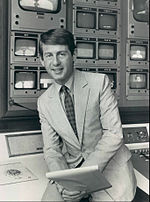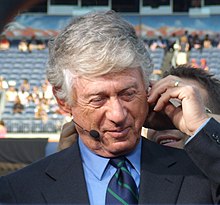Ted Koppel
Edward James Martin Koppel (born February 8, 1940) is a British-born American broadcast journalist, best known as the anchor for Nightline, from the program's inception in 1980 until 2005.
To help the British economy, the Home Secretary invited him and his wife to move the factory to Lancashire, England, where he was promised they would be protected in the event of war.
[3] The factory moved in 1936, but when war broke out in Europe in 1939, Koppel's father was declared an enemy alien and imprisoned on the Isle of Man for a year and a half.
Following the end of the war, the family earned some money from their confiscated assets and decided to leave for the United States.
In 1953 when he was 13, the family immigrated to the United States,[3] where his mother, Alice, became a singer and pianist, and his father, Edwin, opened a tire factory.
[4] Koppel's boyhood hero was radio broadcaster Edward R. Murrow, whose factual reports during the bombing of London inspired him to become a journalist.
In June 1963, he became the youngest correspondent ever hired by ABC Radio News, working on the daily Flair Reports program.
[3] He returned in 1968 to cover the campaign of Richard Nixon, before becoming Hong Kong bureau chief, and U.S. State Department correspondent where Koppel formed a friendship with Henry Kissinger.
[3] According to Nixon advisor John Ehrlichman, Koppel's friendship with Kissinger was partly due to their similar backgrounds, having Jewish refugee parents and emigrating to America in their youth.
[11] Koppel would often report on State Department foreign conferences, as when he traveled with Kissinger during his meetings in Egypt and Israel in 1975.
"[3] In the mid-1970s, Koppel took a year off from his career, to stay home with his children so that his wife could complete her education at Georgetown Law School.
The program originated as a series of special reports about the 444-day-long Iran hostage crisis, during which Iranian militants held 52 Americans captive, beginning in early November 1979.
The show was envisioned by ABC News Vice President George Watson as a way to address any media bias that viewers might believe that they encountered on the network.
Broadcast before a live audience, it provided viewers with a chance to question how stories were reported or critique television news.
Some liberal groups suggested that Koppel was a conduit for the government's point of view and accused him of favoring conservatives when selecting guests.
His final Nightline broadcast did not feature clips highlighting memorable interviews and famous moments from his tenure as host, as is typical when an anchor retires.
Instead, the show replayed an episode of Nightline with Koppel's 1995 interviews with retired Brandeis University sociology professor Morrie Schwartz, who was dying of Lou Gehrig's disease.
[20] On March 24, 2020, Koppel made a guest appearance on Nightline to mark the program's 40th anniversary, discussing how he and his wife had been coping with the COVID-19 pandemic.


